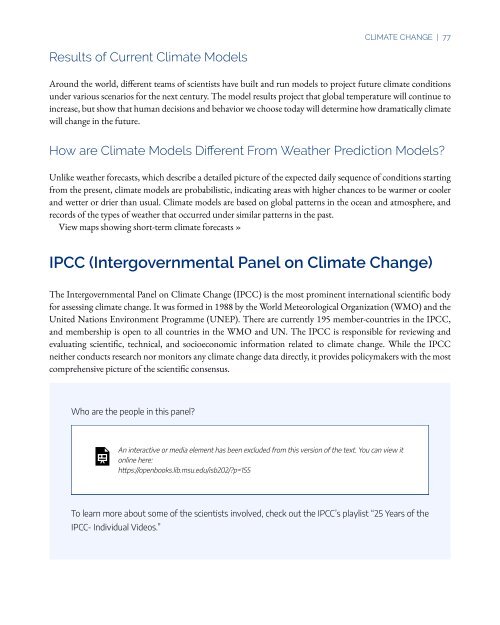An Interactive Introduction to Organismal and Molecular Biology, 2021
An Interactive Introduction to Organismal and Molecular Biology, 2021
An Interactive Introduction to Organismal and Molecular Biology, 2021
You also want an ePaper? Increase the reach of your titles
YUMPU automatically turns print PDFs into web optimized ePapers that Google loves.
CLIMATE CHANGE | 77<br />
Results of Current Climate Models<br />
Around the world, different teams of scientists have built <strong>and</strong> run models <strong>to</strong> project future climate conditions<br />
under various scenarios for the next century. The model results project that global temperature will continue <strong>to</strong><br />
increase, but show that human decisions <strong>and</strong> behavior we choose <strong>to</strong>day will determine how dramatically climate<br />
will change in the future.<br />
How are Climate Models Different From Weather Prediction Models?<br />
Unlike weather forecasts, which describe a detailed picture of the expected daily sequence of conditions starting<br />
from the present, climate models are probabilistic, indicating areas with higher chances <strong>to</strong> be warmer or cooler<br />
<strong>and</strong> wetter or drier than usual. Climate models are based on global patterns in the ocean <strong>and</strong> atmosphere, <strong>and</strong><br />
records of the types of weather that occurred under similar patterns in the past.<br />
View maps showing short-term climate forecasts »<br />
IPCC (Intergovernmental Panel on Climate Change)<br />
The Intergovernmental Panel on Climate Change (IPCC) is the most prominent international scientific body<br />
for assessing climate change. It was formed in 1988 by the World Meteorological Organization (WMO) <strong>and</strong> the<br />
United Nations Environment Programme (UNEP). There are currently 195 member-countries in the IPCC,<br />
<strong>and</strong> membership is open <strong>to</strong> all countries in the WMO <strong>and</strong> UN. The IPCC is responsible for reviewing <strong>and</strong><br />
evaluating scientific, technical, <strong>and</strong> socioeconomic information related <strong>to</strong> climate change. While the IPCC<br />
neither conducts research nor moni<strong>to</strong>rs any climate change data directly, it provides policymakers with the most<br />
comprehensive picture of the scientific consensus.<br />
Who are the people in this panel?<br />
<strong>An</strong> interactive or media element has been excluded from this version of the text. You can view it<br />
online here:<br />
https://openbooks.lib.msu.edu/isb202/?p=155<br />
To learn more about some of the scientists involved, check out the IPCC’s playlist “25 Years of the<br />
IPCC- Individual Videos.”


















